Colorectal Cancer
Reducing disease progression
Colorectal cancer is the rapid growth of abnormal cells in the bowel and colon that impairs the function of the body. According to the World Health Organization 1.8 million new cases were diagnosed in 2018, and 861,000 people died of the disease.
Genetic factors can increase colorectal cancer risk, but lifestyle factors such as physical inactivity, diets high in red meat and low in fibre, low socio-economic status, obesity and smoking all play a part. Australia, New Zealand, Europe, and North America have the highest rates of disease, and colorectal cancer accounts for 11% of the Australian disease burden, and cost AUD$1.1 billion in annual health costs.

Treatment and interventions to slow progression
Bowel screening can help identify and remove polyps, to prevent their development into bowel cancer. If you contract the disease, surgery and medications can treat it, However,studies show that increasing exercise levels can reduce your chances of dying, slow cancer progression, reduce treatment side effects, and may improve your functional wellbeing.
Many survivors will require support to help them overcome the fear of pain and fatigue, the a belief that cancer treatment requires rest rather than exercise, and motivation issues.
Community sport-based programs may offer opportunities to provide accessible, supported exercise to improve patient health and reduce disease progression, but greater follow-up and study is needed to understand program impacts at 5 or more years pot diagnosis.
Sport Prescriptions offers the opportunity to standardise intervention design, measurement, evaluation and reporting, and to make participant follow-up easier. This will help identify interventions that work to reduce colorectal cancer progression and the ways to improve them
